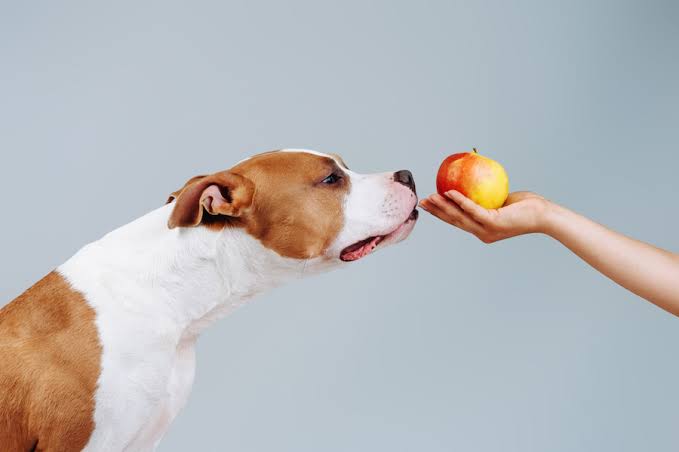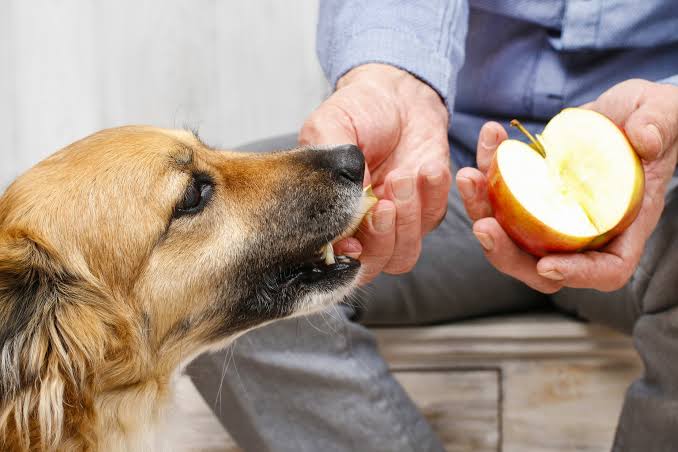Apples are a popular fruit enjoyed by many humans for their sweet taste and various health benefits. But can dogs eat apples? In this guide, we’ll explore the nutritional benefits of apples for dogs, how to safely feed them to your furry friend, potential risks and considerations, and much more.
Recommended article: Best Food for Dogs with Allergies
Nutritional Benefits of Apples for Dogs
Apples are packed with essential nutrients that can be beneficial for dogs when consumed in moderation. They are a good source of vitamins A and C, which are important for maintaining healthy skin, coat, and immune system. Apples also contain fiber, which can aid in digestion and regulate bowel movements in dogs. Additionally, apples are low in fat and calories, making them a healthy treat option for dogs.
Can Dogs Safely Eat Apples?

Yes, dogs can safely eat apples in moderation. Apples are not toxic to dogs and are considered a safe and healthy treat when given in appropriate amounts. However, it’s essential to remove the core and seeds before feeding apples to your dog, as they can be harmful if ingested in large quantities.
Recommended article: Bark Collar For Large Dogs
How to Feed Apples to Dogs

When feeding apples to your dog, it’s essential to prepare them properly to avoid any potential choking hazards or digestive problems. Here are some tips on how to feed apples to your canine companion:
- Remove the Core and Seeds: The core and seeds of apples can be choking hazards and contain cyanide, which is toxic to dogs. Always remove the core and seeds before feeding apples to your dog.
- Cut into Small Pieces: Cut apples into small, bite-sized pieces that are easy for your dog to chew and digest.
- Monitor for Allergic Reactions: Some dogs may be allergic to apples. If you notice any signs of an allergic reaction, such as itching, swelling, or difficulty breathing, discontinue feeding apples and consult your veterinarian.
Recommended article: Are Carnations Toxic To Dogs?
Potential Risks and Considerations
While apples are generally safe for dogs, there are some risks and considerations to keep in mind. Some dogs may have difficulty digesting apples, leading to gastrointestinal issues such as vomiting or diarrhea. It’s essential to monitor your dog’s reaction after feeding them apples and consult with your veterinarian if you notice any adverse effects.
How Many Apples Can Dogs Eat?
While apples can be a healthy treat for dogs, it’s essential to feed them in moderation. Too many apples can lead to digestive issues and obesity in dogs. As a general rule of thumb, treats should not make up more than 10% of your dog’s daily caloric intake.
Frequently Asked Questions
1. Are Apples Safe for Dogs to Eat?
- Yes, they are a nutritious treat that can be beneficial for your dog’s health when fed appropriately.
2. Can Dogs Eat Apple Cores?
- No, dogs should not eat apple cores as they contain seeds, which can be a choking hazard and contain cyanide, which is toxic to dogs. Always remove the core and seeds before feeding apples to your dog.
3. Are There Any Health Benefits of Feeding Apples to Dogs?
- Yes, apples are a good source of vitamins A and C, fiber, and antioxidants, which can support your dog’s overall health, including their skin, coat, and immune system.
4. How Should I Prepare Apples for My Dog?
- To prepare apples for your dog, wash them thoroughly to remove any dirt or pesticides. Remove the core and seeds, and cut the apple into small, bite-sized pieces that are easy for your dog to chew and digest.
5. Can Dogs Eat Apple Peels?
- Yes, dogs can eat apple peels, but they should be fed in moderation. Apple peels are rich in fiber, which can aid in digestion, but too much fiber can lead to digestive issues in dogs.
Recommended article: Senior Dogs Arthritis Exercises
Conclusion
In conclusion, apples can be a healthy and enjoyable treat for dogs when fed in moderation and prepared properly. They are rich in essential nutrients and can provide various health benefits for your canine companion. However, it’s important to monitor your dog’s reaction and consult with your veterinarian if you have any concerns. With proper preparation and moderation, apples can be a safe and tasty addition to your dog’s diet.
For more information on pet nutrition and care, visit our website. We’re committed to providing valuable resources to help you keep your furry friend healthy and happy.

